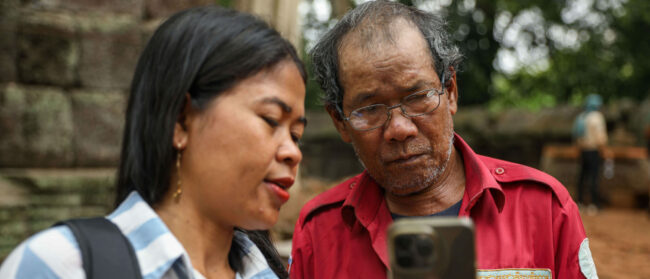A ceasefire agreement between ethnic rebels and the government has paved the way for tourists to enter the isolated Karen state
Text and photography by Brennan O’Connor
The mountain pass after Myawaddy, the Myanmar-Thai border town in Karen state, is so winding and narrow that authorities alternate the direction of traffic each day. A bus once drove off edge and plummeted so far into the deep valley below that it looked to be the size of a pinhead from the road above. Passing motorists didn’t stop to see if anyone survived. They knew nobody would.
Despite the numerous hazards associated with traversing this highway, some foreigners are eager to make the land journey from Thailand to Hpa-an, the Karen state capital.
In July 2010, a disagreement between the Myanmar and Thai governments resulted in the border being closed for over a year. Even after the Friendship Bridge separating the two countries reopened, foreigners could not travel further than Myawaddy. Now, however, those game enough can call shotgun and crawl past scores of broken-down buses sitting alongside the highway – their suspension just cannot bear the brutal route – and peer at the vertiginous drop, threatening motorists at every turn.
Fighting between Karen ethnic armed groups and the previous ruling military regime has kept Karen state isolated from the world for well over half a century. Now, for the first time since the border was created, a nearly two-year-old ceasefire agreement between ethnic armed groups such as the Karen National Union and the government has paved the way for foreigners to enter the state from several Thai land crossings.
Four years ago, such a journey was near impossible. On the day of the November 2010 Myanmar general elections, the Democratic Karen Benevolent Army (formerly the Democratic Karen Buddhist Army) took over Myawaddy in protest against the government’s attempt to force the country’s armed groups to amalgamate into a border guard force. Fighting with government troops displaced over 10,000 people who spilled over into neighbouring Thailand. The elections were widely dismissed as fraudulent by Western countries, while the United Nations expressed deep concern – thousands of votes were cast using the names of deceased persons.
At that time, those attempting to enter Karen state did so the unofficial way – crisscrossing the porous border separating Thailand from Myanmar and encountering displaced populations and armed groups along the way.
The Karen News English website is one of the few independent ethnic media groups reporting on the situation affecting the Karen ethnicity. Last year, the government gave the news group, which is also part of the ethnic media alliance Burma News International, the green light to publish a monthly news journal inside the country. Before this, journalists had to smuggle their reports across the border, risking lengthy jail sentences.
“Until now we haven’t had any problem, but it also depends on the issue you are reporting,” said Saw Blacktown, a journalist with Karen News English. “If the issue is sensitive, we still need to be careful.”
Now that the ceasefire agreement has ended the fighting, civilians have more freedom of movement and the internally displaced populations affected by the conflict can return to their homes, but much still needs to be done.
“We still have some areas where the army are still constructing their military camps. This is causing destruction to the local villages because they expected that the peace process or ceasefire would be moving further [in a positive direction],” said Blacktown. “Some of the people see the government as taking advantage of the ceasefire.”
Most Myanmar still fear the army and the problem of landmines remains, according to Blacktown. A battery in a government-laid landmine lasts about 50 years, while ones planted by ethnic armed groups last between six and 12 months at most. There are still thousands of active landmines in Karen state alone.
“There is also an issue about the development of projects in the ethnic area,” said Blacktown. “Most of the time it doesn’t benefit the local community at all.”
Some of these large-scale projects undertaken by companies with links to the former military regime go hand-in-hand with land confiscations; most villagers have no land deeds, making them extremely vulnerable.
“For generations the Karen have worked on the land and the majority doesn’t have any papers, but the local community recognises who this land belongs to,” explained Blacktown. Still, the journalist agrees that the ceasefire is improving the situation and the opening of the highway to foreigners is a positive step, even if it is mostly to facilitate business and impress the international community. Much of the state is still largely inaccessible to non-Myanmar nationals, including international non-governmental organisations with projects there.
“For the international staff, they still can’t travel in the ethnic armed group areas,” said Blacktown. “For example, the staff of an NGO might want to visit a partner or project area. But they are not allowed without guards or security personnel. If the government wants to relax the travelling, they should relax everything, not just the area they want to relax.”
In the past, the army made sure the road was secure – it was already mostly safe for international travellers – but, according to Balcktown, “maybe they didn’t want the foreigners to see the [real] situation”.

